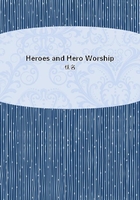
第8章
Of the other Gods or Jotuns I will mention only for etymology's sake, that Sea-tempest is the Jotun _Aegir_, a very dangerous Jotun;--and now to this day, on our river Trent, as I learn, the Nottingham bargemen, when the River is in a certain flooded state (a kind of backwater, or eddying swirl it has, very dangerous to them), call it Eager; they cry out, "Have a care, there is the _Eager_ coming!" Curious; that word surviving, like the peak of a submerged world! The _oldest_ Nottingham bargemen had believed in the God Aegir. Indeed our English blood too in good part is Danish, Norse; or rather, at bottom, Danish and Norse and Saxon have no distinction, except a superficial one,--as of Heathen and Christian, or the like. But all over our Island we are mingled largely with Danes proper,--from the incessant invasions there were: and this, of course, in a greater proportion along the east coast; and greatest of all, as I find, in the North Country. From the Humber upwards, all over Scotland, the Speech of the common people is still in a singular degree Icelandic; its Germanism has still a peculiar Norse tinge. They too are "Normans," Northmen,--if that be any great beauty!--Of the chief god, Odin, we shall speak by and by. Mark at present so much;what the essence of Scandinavian and indeed of all Paganism is: a recognition of the forces of Nature as godlike, stupendous, personal Agencies,--as Gods and Demons. Not inconceivable to us. It is the infant Thought of man opening itself, with awe and wonder, on this ever-stupendous Universe. To me there is in the Norse system something very genuine, very great and manlike. A broad simplicity, rusticity, so very different from the light gracefulness of the old Greek Paganism, distinguishes this Scandinavian System. It is Thought; the genuine Thought of deep, rude, earnest minds, fairly opened to the things about them; a face-to-face and heart-to-heart inspection of the things,--the first characteristic of all good Thought in all times. Not graceful lightness, half-sport, as in the Greek Paganism; a certain homely truthfulness and rustic strength, a great rude sincerity, discloses itself here. It is strange, after our beautiful Apollo statues and clear smiling mythuses, to come down upon the Norse Gods "brewing ale" to hold their feast with Aegir, the Sea-Jotun; sending out Thor to get the caldron for them in the Jotun country; Thor, after many adventures, clapping the Pot on his head, like a huge hat, and walking off with it,--quite lost in it, the ears of the Pot reaching down to his heels!
A kind of vacant hugeness, large awkward gianthood, characterizes that Norse system; enormous force, as yet altogether untutored, stalking helpless with large uncertain strides. Consider only their primary mythus of the Creation. The Gods, having got the Giant Ymer slain, a Giant made by "warm wind," and much confused work, out of the conflict of Frost and Fire,--determined on constructing a world with him. His blood made the Sea; his flesh was the Land, the Rocks his bones; of his eyebrows they formed Asgard their Gods'-dwelling; his skull was the great blue vault of Immensity, and the brains of it became the Clouds. What a Hyper-Brobdignagian business! Untamed Thought, great, giantlike, enormous;--to be tamed in due time into the compact greatness, not giantlike, but godlike and stronger than gianthood, of the Shakspeares, the Goethes!--Spiritually as well as bodily these men are our progenitors.
I like, too, that representation they have of the tree Igdrasil. All Life is figured by them as a Tree. Igdrasil, the Ash-tree of Existence, has its roots deep down in the kingdoms of Hela or Death; its trunk reaches up heaven-high, spreads its boughs over the whole Universe: it is the Tree of Existence. At the foot of it, in the Death-kingdom, sit Three _Nornas_, Fates,--the Past, Present, Future; watering its roots from the Sacred Well.
Its "boughs," with their buddings and disleafings?--events, things suffered, things done, catastrophes,--stretch through all lands and times.
Is not every leaf of it a biography, every fibre there an act or word? Its boughs are Histories of Nations. The rustle of it is the noise of Human Existence, onwards from of old. It grows there, the breath of Human Passion rustling through it;--or storm tost, the storm-wind howling through it like the voice of all the gods. It is Igdrasil, the Tree of Existence.
It is the past, the present, and the future; what was done, what is doing, what will be done; "the infinite conjugation of the verb _To do_."Considering how human things circulate, each inextricably in communion with all,--how the word I speak to you to-day is borrowed, not from Ulfila the Moesogoth only, but from all men since the first man began to speak,--Ifind no similitude so true as this of a Tree. Beautiful; altogether beautiful and great. The "_Machine_ of the Universe,"--alas, do but think of that in contrast!
Well, it is strange enough this old Norse view of Nature; different enough from what we believe of Nature. Whence it specially came, one would not like to be compelled to say very minutely! One thing we may say: It came from the thoughts of Norse men;--from the thought, above all, of the _first_ Norse man who had an original power of thinking. The First Norse "man of genius," as we should call him! Innumerable men had passed by, across this Universe, with a dumb vague wonder, such as the very animals may feel; or with a painful, fruitlessly inquiring wonder, such as men only feel;--till the great Thinker came, the _original_ man, the Seer; whose shaped spoken Thought awakes the slumbering capability of all into Thought.